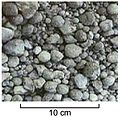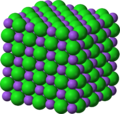materials science, a grain boundary is the interface between two grains, or crystallites, in a polycrystalline material. Grain boundaries are two-dimensional...
31 KB (4,175 words) - 03:37, 5 May 2025
science, grain-boundary strengthening (or Hall–Petch strengthening) is a method of strengthening materials by changing their average crystallite (grain) size...
33 KB (4,203 words) - 19:02, 23 May 2025
Crystallite (redirect from Grain (metal))
Grain boundary migration occurs when a shear stress acts on the grain boundary plane and causes the grains to slide. This means that fine-grained materials...
15 KB (1,724 words) - 08:00, 14 June 2025
Grain boundary sliding (GBS) is a material deformation mechanism where grains slide against each other. This occurs in polycrystalline material under...
22 KB (2,860 words) - 00:06, 23 May 2025
Sintering (section Grain boundary energy/tension)
diffusion from grain boundary – atom from grain boundary diffuses through lattice grain boundary diffusion – atoms diffuse along grain boundary plastic deformation...
51 KB (7,073 words) - 00:37, 24 May 2025
Segregation (materials science) (section Langmuir–McLean theory for surface and grain boundary segregation in binary systems)
polycrystalline solids, segregation occurs at defects, such as dislocations, grain boundaries, stacking faults, or the interface between two phases. In liquid solutions...
23 KB (3,613 words) - 04:39, 16 November 2022
occurs when a crack propagates along the grain boundaries of a material, usually when these grain boundaries are weakened. The more commonly seen transgranular...
11 KB (1,285 words) - 09:24, 12 June 2025
grain boundaries. The other process involves differences in stored strain energy between neighboring grains, resulting in migration of existing grain...
8 KB (904 words) - 12:48, 24 September 2024
area of grain boundary. The term is commonly used in metallurgy but is also used in reference to ceramics and minerals. The behaviors of grain growth is...
17 KB (2,058 words) - 12:22, 23 May 2025
Intergranular corrosion (redirect from Grain boundary depletion)
otherwise corrosion-resistant alloys, when the grain boundaries are depleted, known as grain boundary depletion, of the corrosion-inhibiting elements...
10 KB (1,369 words) - 14:41, 21 May 2024
Coble creep (section Grain boundary sliding)
of the grain boundaries. American materials scientist Robert L. Coble first reported his theory of how materials creep across grain boundaries and at...
11 KB (1,773 words) - 19:18, 19 May 2025
hardening Solid solution strengthening Precipitation strengthening Grain boundary strengthening Where deforming the material will introduce dislocations...
22 KB (2,747 words) - 06:19, 26 May 2025
weighted average of the grain boundary diffusion coefficient and the lattice diffusion coefficient. Diffusion along both the grain boundary and in the lattice...
2 KB (291 words) - 05:27, 19 October 2023
benefit greatly from grain boundary engineering. Grain boundary engineering attempts to generate higher amounts of special grain boundaries, characterized by...
15 KB (1,882 words) - 21:40, 12 November 2024
which reduces the grain boundary energy and results in better grain boundary cohesion and ductility. Another form of grain boundary strengthening is achieved...
83 KB (10,206 words) - 13:25, 15 June 2025
Deformation mechanism (section Grain boundary sliding)
deformation mechanisms processes include: § Fracturing § Cataclastic flow § Grain boundary sliding § Diffusive mass transfer § Dislocation creep § Dynamic recrystallization...
32 KB (4,150 words) - 18:57, 22 May 2025
slip plane(s). Hence, dislocations cannot pass from one grain to another across the grain boundary. The following sections explore specific GB requirements...
30 KB (3,531 words) - 12:19, 6 June 2025
creating physical barriers from second phase precipitates forming along grain boundaries. There are five main strengthening mechanisms for metals, each is a...
49 KB (6,877 words) - 16:12, 26 April 2025
Crystal structure (section Grain boundaries)
Microstructural defects: Pores and crystallites tend to have straight grain boundaries following higher density planes. Cleavage: This typically occurs preferentially...
46 KB (5,182 words) - 11:48, 9 June 2025
through the crystal grains of a material. In contrast to intergranular fractures, which occur when a fracture follows the grain boundaries, this type of fracture...
9 KB (1,070 words) - 15:55, 23 May 2025
based on the fact that the amount of grain boundary area is reduced when a particle is located on a grain boundary. It is also assumed that particles are...
2 KB (256 words) - 19:56, 17 August 2020
of a grain boundary opens diffusion pathways, leading to the activation of one grain in an otherwise inactive microstructure and allowing the grain to rotate...
8 KB (895 words) - 01:20, 12 October 2024
increasingly large carbide particles form preferentially at grain boundaries, preventing grain boundary sliding at high temperatures. This leads to an increase...
15 KB (1,901 words) - 18:23, 23 May 2025
risk of grain boundary sliding at elevated temperatures, while also decreasing dislocation mobility within the material. The new grains are less strained...
16 KB (1,953 words) - 21:56, 23 May 2025
The grain boundary diffusion coefficient is the diffusion coefficient of a diffusant along a grain boundary in a polycrystalline solid. It is a physical...
5 KB (693 words) - 12:50, 26 May 2025
intrinsic activation energy and a weaker dependence on grain size. As grain size gets smaller, grain boundary area gets larger, so dislocation motion is impeded...
65 KB (8,845 words) - 20:56, 12 May 2025
Crystal twinning (redirect from Twin boundary)
Julian E.; Minor, Andrew M. (2019-07-01). "Statistical analysis of twin/grain boundary interactions in pure rhenium". Acta Materialia. 173: 44–51. Bibcode:2019AcMat...
52 KB (5,995 words) - 14:39, 22 May 2025
themselves into tilt boundaries, a simple example of a low-angle grain boundary. Grain boundary theory predicts that an increase in boundary misorientation...
6 KB (849 words) - 17:42, 11 March 2023
and a grain boundary. Like a grain boundary, a twin boundary has different crystal orientations on its two sides. But unlike a grain boundary, the orientations...
33 KB (3,743 words) - 14:46, 26 May 2025
unlikely. Grain boundary initiation and interface interaction are more common sources of dislocations. Irregularities at the grain boundaries in materials...
41 KB (5,961 words) - 03:33, 30 April 2025


















